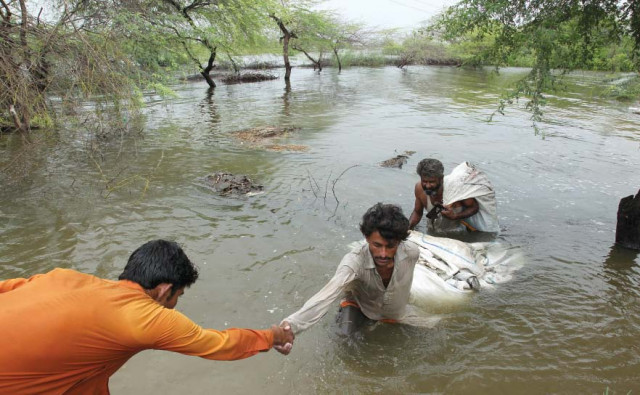Who is in charge?: Aid crisis as agencies confused
Sindh asks for relief within 24 hours, while NDMA wants UN only for early recovery.

Who is in charge?: Aid crisis as agencies confused
Although the Pakistani government has now formally invited the United Nations to help with the relief of flood survivors, there seems to be a difference of opinion between the Sindh government and the National Disaster Management Authority (NDMA) about the actual operations.
A UN official privy to the matter revealed that the NDMA does not want the UN to focus on immediate relief, but to help with the latter phase of early recovery. This leaves the organisation with nothing to do in the meantime but gather data for assessment.
According to him, Chief Minister Qaim Ali Shah asked the UN to begin relief work in the province within 24 hours on Friday. “But, afterwards the chairman of the NDMA stopped us and asked us to focus on the assessment of the loss of property, crops and other things for the recovery phase,” he added.
This has created considerable confusion over whose orders need to be followed. There are questions as to why the UN is being stopped from providing aid, which it can immediately.
The Economic Affairs Division of Pakistan had written a letter to the UN to request its assistance on September 6. “Can the NDMA overrule the economic division?” this official asked.
Although the United Nations Development Programme (UNDP) has set up a base camp in Badin, it will only conduct needs for the recovery phase, and not provide relief, said the UN official.
Many administrations of the calamity-hit districts have requested the provincial and federal governments to take control of the relief work as they lack the resources and the ability to respond immediately. Badin district has exhausted its available resources. “We have exhausted our funds during the past 29 days,” confirmed an official of the district administration.
The Badin government had written a letter to the provincial government on the instructions of National Assembly Speaker Dr Fehmida Mirza for the instant release of Rs5 million out of the Rs20 million that was pledged.
On Friday, APP reported that Chief Minister Qaim Ali Shah met a seven-member delegation of the United Nations and stressed that they needed complete support and assistance. The chairman of the NDMA, Zafar Iqbal Qadir, was at the meeting. He said that the federal government has decided to assist the people of Sindh. The director-general of the Provincial Disaster Management Authority Saleh Farooqui gave details of their work. The resident coordinator for the UN in Pakistan said that they are working with the federal and provincial governments on relief. He assured that the UN would play its role.
UN OCHA meeting
The UN Office of Coordination for Humanitarian Affairs (OCHA) held a meeting with the representatives of up to 200 non-governmental organisations at the Shahbaz Hall on Friday.
Yasmine Rockenfeller, the deputy head, and Fawad Hussain, the humanitarian affairs officer, briefed hundreds of participants about the registration process for gathering data and damage assessment.
The UN agencies will work in partnership with the local NGOs. Unicef will look after water and sanitation, the World Health Organisation will deal with health, the International Organisation for Migration will look after shelter for the displaced people, and the World Food Programme and the Food and Agriculture Organisation will work on food security.
According to Fawad Hussain of UN OCHA, the assessments of local NGOs will also be relayed to the international community through the UN. “They will be able to obtain direct funding from the international donors then,” he said.
“The local community and stakeholders know the local needs better,” elaborated Dr Salman Safdar, the humanitarian affairs coordinator. “So, the assessment will be done quicker, especially for many areas which have become inaccessible,” he said.
According to him, the NGOs will be able to file assessment reports within a week to 10 days. Rockenfeller told The Express Tribune that the UN will co-lead the humanitarian response and assessment with the government. “We have come to an agreement to respond at once for relief and early recovery.”
Published in The Express Tribune, September 10th, 2011.



















COMMENTS
Comments are moderated and generally will be posted if they are on-topic and not abusive.
For more information, please see our Comments FAQ